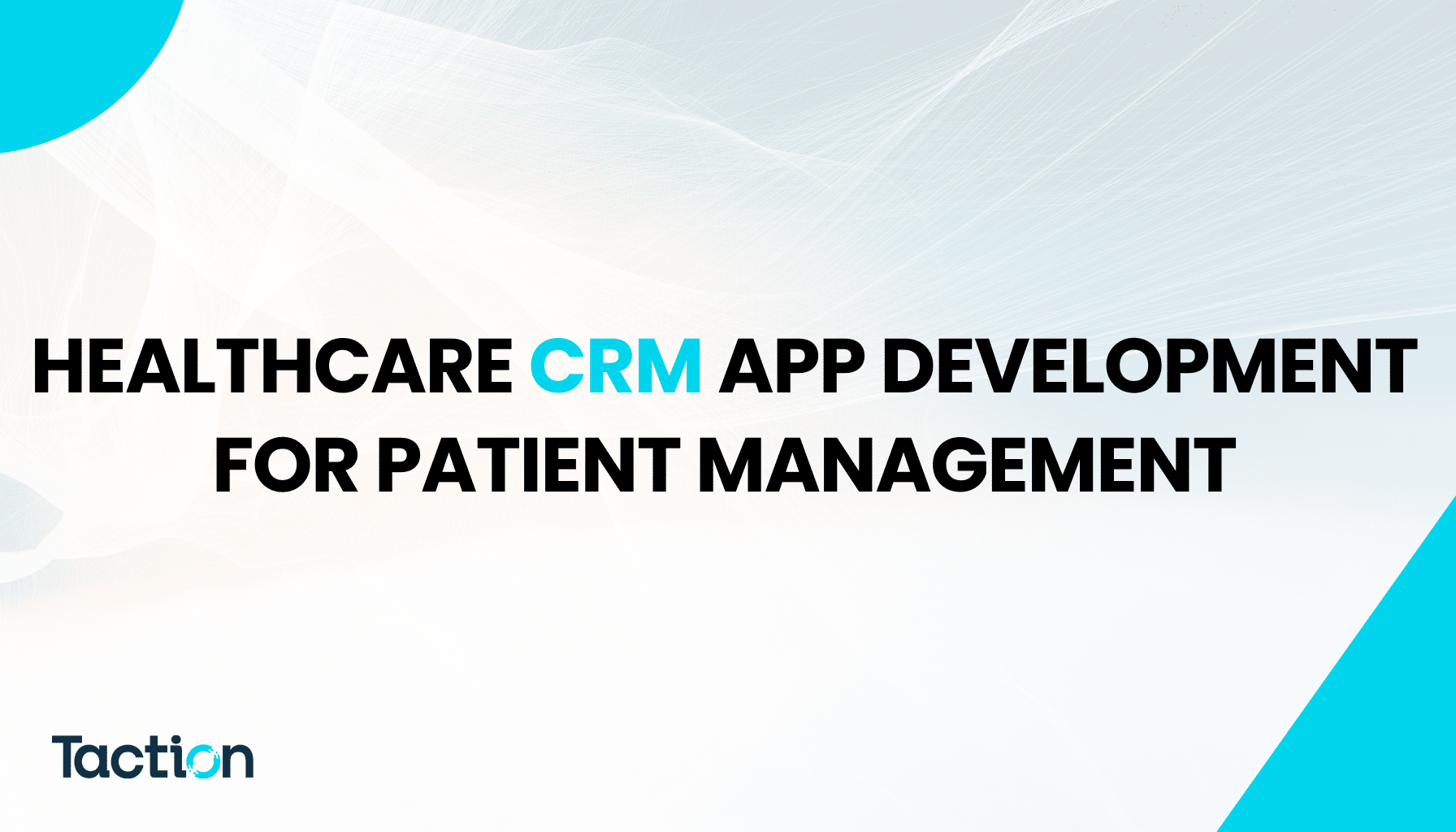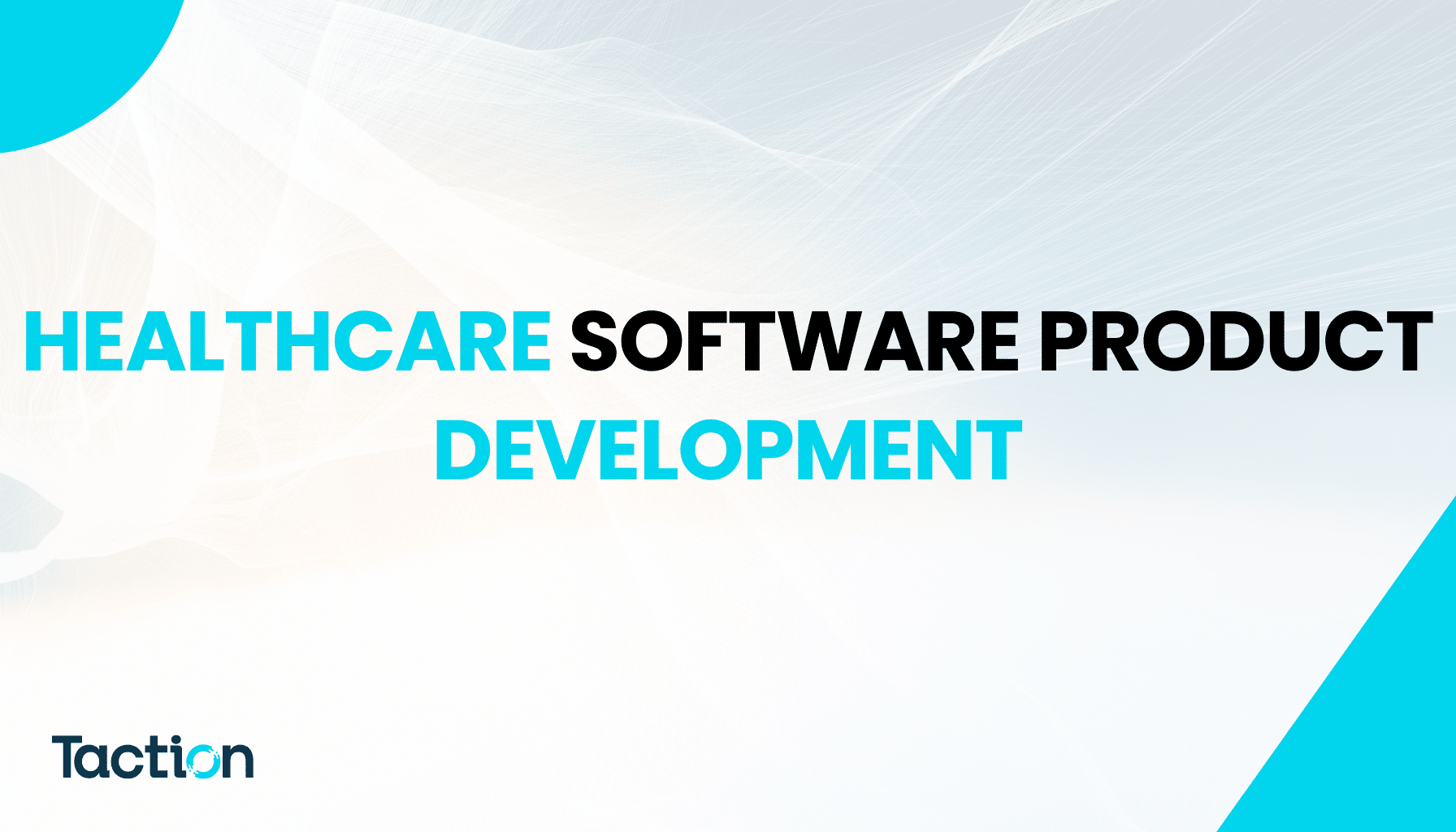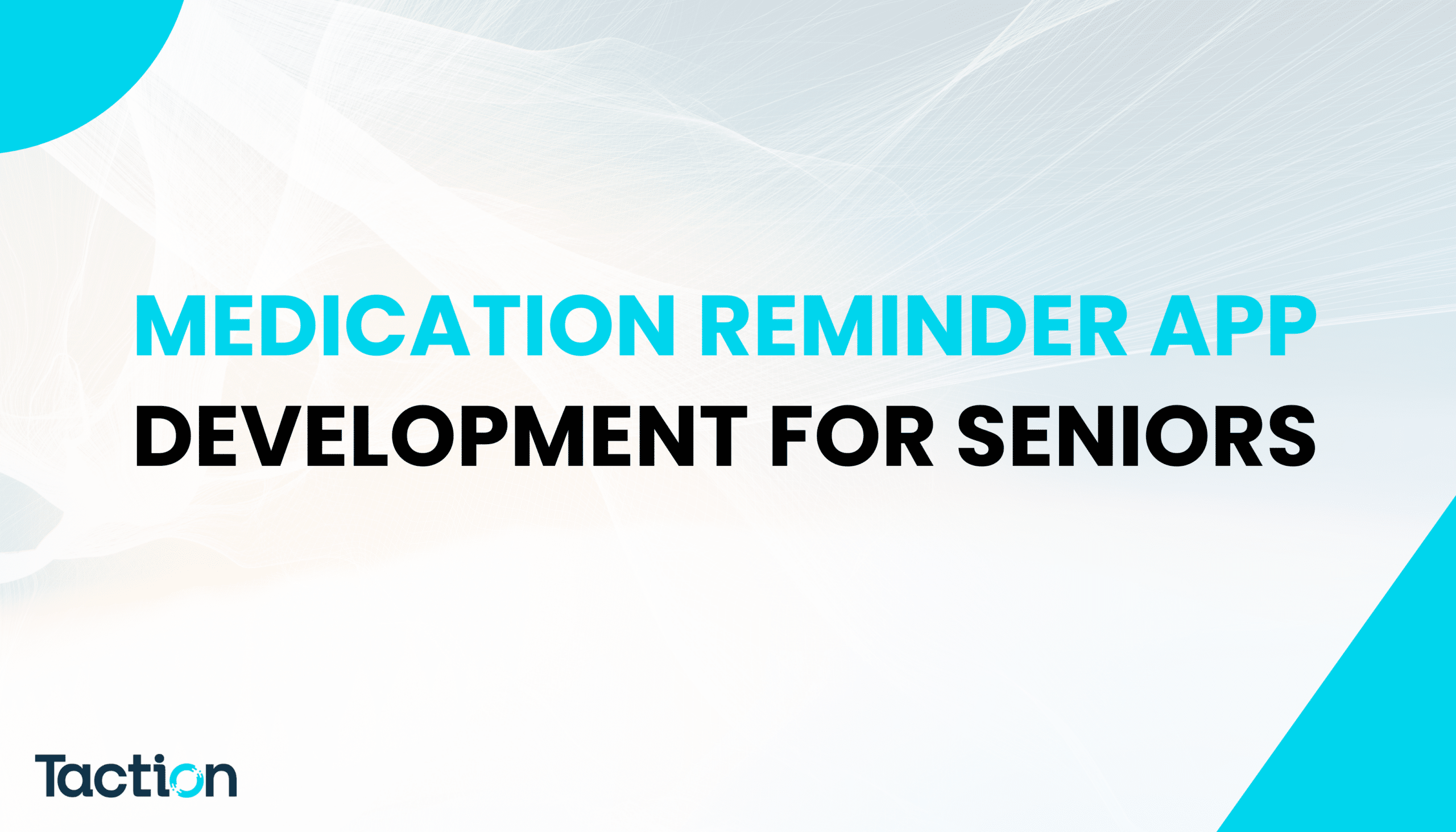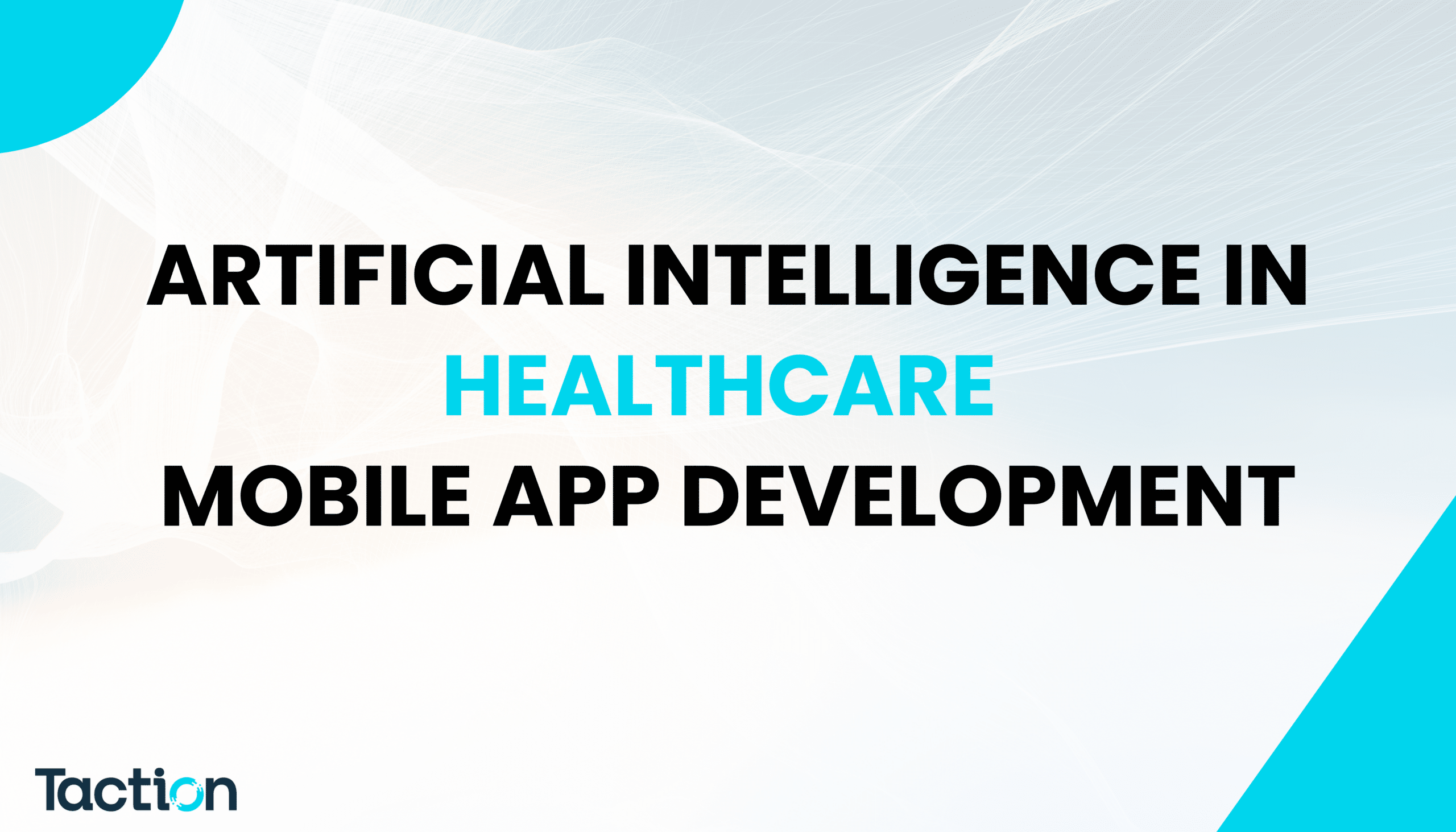Why Healthcare Providers Need a CRM Built for Patients, Not Just Sales
Traditional CRMs are built to drive sales and manage leads—but healthcare operates on a completely different set of priorities. A healthcare-specific CRM focuses on patient engagement, care coordination, and compliance, not just transactions. It enables providers to track patient interactions across departments, personalize outreach, and automate appointment reminders—all while staying compliant with HIPAA regulations.
Unlike off-the-shelf CRM tools, a custom healthcare CRM is designed to integrate seamlessly with EHRs, billing systems, and telehealth platforms. It serves everyone in the ecosystem—from front-desk staff managing intake to clinicians following up on treatment plans.
At Taction Software, we’ve spent over 20 years building CRM solutions tailored for the complex needs of US healthcare providers. Let us show you how a patient-first CRM can transform your operations and outcomes.
Improve patient care now.
See how our CRM helps you.
Real-World Problems We Solve with Custom Healthcare CRMs
US healthcare organizations face unique operational challenges that generic software simply can’t solve. Missed appointments continue to cost providers millions each year, especially in systems reliant on Medicare reimbursements. Our custom healthcare CRMs tackle this head-on with automated reminders, rescheduling workflows, and no-show tracking.
Another critical issue is the disconnect between front desk staff and clinical teams, leading to delays, miscommunication, and patient frustration. We build CRMs that bridge these gaps—enabling real-time updates, task assignment, and unified patient views across departments.
Poor follow-ups and low satisfaction scores can impact both patient outcomes and provider ratings. Our CRM solutions include care plan tracking, personalized outreach, and patient feedback modules to ensure consistent, coordinated care—across multiple facilities, states, and provider networks.
Step 1 – Define Your Healthcare CRM Goals Based on Operational Gaps
Before writing a single line of code, it’s essential to map out your healthcare organization’s biggest operational gaps. A well-built CRM doesn’t just store contact information—it solves real problems. Whether you’re a hospital, clinic, or specialty care group, your CRM should be tailored to streamline specific workflows.
Common goals include automating patient intake, tracking referrals, or improving post-discharge follow-ups. For example, a multi-location clinic might prioritize unified scheduling across sites, while a cardiology practice may need custom follow-up reminders tied to treatment plans.
At Taction Software, we begin every project by identifying these unique challenges—so the CRM becomes an intelligent tool, not another layer of complexity.
Step 2 – Build Patient-Centric Workflows, Not Just Dashboards
A successful healthcare CRM should do more than display data—it should actively guide the entire patient journey, from the first point of contact to long-term care follow-up. This requires building workflows that are intuitive, responsive, and tailored to how real healthcare teams operate daily.
Picture a patient booking a telehealth appointment. The CRM sends automated reminders, prompts the patient to complete pre-visit paperwork, and alerts staff as soon as it’s submitted. Post-consultation, the system tracks lab results, schedules follow-up visits, and logs every interaction—ensuring no task is missed.
By designing for real-world care scenarios, we enable providers to deliver proactive, coordinated care—not just manage data. Patient-centric workflows transform your CRM from a passive database into an active engine of patient success.
Appointment Scheduling App for Healthcare Providers in the US
Step 3 – Integrate with EHRs, Billing Systems, and Appointment Engines
No healthcare CRM can operate in isolation. To truly streamline operations, it must seamlessly integrate with your existing EHRs, billing platforms, and appointment scheduling systems. This level of interoperability ensures that every patient interaction—clinical or administrative—is connected, traceable, and secure.
We specialize in standards-based integrations using HL7, FHIR, and C-CDA protocols to ensure real-time data exchange. Our team has successfully integrated CRMs with leading platforms like Epic, Cerner, Allscripts, and other major hospital systems across the US.
With real-time sync, providers can view up-to-date patient data, while billing departments receive immediate updates on service delivery. Plus, detailed audit trails support HIPAA compliance and internal quality assurance. Integration isn’t just a technical checkbox—it’s the foundation of a unified, intelligent care ecosystem.
Step 4 – Ensure Full HIPAA & Regional Compliance from Day One
In the healthcare industry, compliance isn’t optional—it’s mission-critical. From the moment development begins, your CRM must be built with HIPAA and state-level regulations at its core. This includes implementing end-to-end data encryption, role-based access controls, and comprehensive audit logs to track every user action.
We also configure custom alerts to flag unauthorized access or potential PHI breaches, helping providers respond quickly and mitigate risk. Whether you’re operating in a single state or across multiple jurisdictions, compliance requirements vary—and overlooking them can be costly.
With over two decades of experience in US healthcare IT, Taction Software designs every CRM to be audit-ready from day one—so you can stay focused on patient care, not legal headaches.
Step 5 – Personalize the CRM Experience for Providers and Admins
A one-size-fits-all CRM can overwhelm users with irrelevant data. That’s why we design role-based dashboards tailored to each user type—physicians see clinical insights, front desk staff manage scheduling and intake, while nurses track care plans and follow-ups.
To further enhance usability, we implement smart notifications that prioritize critical updates and reduce alert fatigue. Instead of constant pop-ups, users get actionable prompts based on urgency and role.
The result? A focused, efficient experience that supports every team member—without the clutter or confusion of generic interfaces.
Step 6 – Add AI Features to Automate Patient Engagement
Integrating AI into your healthcare CRM can dramatically enhance patient engagement and operational efficiency. For instance, predictive alerts use historical data to identify patients at risk of missing appointments or hospital readmissions, enabling proactive outreach.
AI-powered chatbots offer 24/7 support by answering common patient questions, assisting with appointment booking, and even guiding users through pre-visit preparations—reducing staff workload and improving accessibility.
Additionally, sentiment analysis on patient feedback helps providers gauge satisfaction trends and identify areas needing improvement, turning unstructured data into actionable insights. These AI-driven features transform your CRM into a smart, patient-focused tool that supports better care and stronger relationships.
Healthcare Software Modernization for Legacy Systems in the USA
Step 7 – Build for Mobile: Patient Access on the Go
In today’s healthcare landscape, patients expect convenient, mobile access to their care. Your CRM should power a secure mobile app that allows patients to schedule appointments, view medical records, and receive timely follow-up reminders—all from their smartphones.
Secure messaging features enable direct communication between patients and providers, improving engagement while maintaining HIPAA compliance.
Whether you choose native iOS and Android apps for optimal performance or Progressive Web Apps (PWAs) for broader device compatibility, mobile-first design ensures your CRM meets patients where they are—anytime, anywhere.
Big Data Analytics Solutions for Healthcare Mobile Applications
Step 8 – Include Reporting & Analytics That Actually Help Providers
Effective healthcare CRMs provide more than raw data—they deliver insights that drive better decisions. Track key metrics like Net Promoter Score (NPS), patient engagement rates, appointment completion, and patient churn to understand and improve care quality.
Our CRMs offer export-ready dashboards tailored for administrators and care managers, enabling quick analysis and easy reporting to stakeholders.
As a bonus, we integrate care quality dashboards aligned with CMS metrics, helping providers monitor performance against federal standards and identify areas for continuous improvement.
Step 9 – User Testing with Frontline Medical Staff
Real success comes from testing your CRM in the hands of those who use it daily. We implement iterative feedback loops with frontline medical staff, ensuring the system adapts to real workflows and challenges.
Testing happens in real-world clinical environments, where we observe and refine usability under authentic conditions.
At Taction, we conduct on-site shadowing during rollout, closely partnering with users to gather insights and make timely improvements—ensuring smooth adoption and maximum impact.
Step 10 – Deployment and Onboarding with Zero Downtime
Deploying a healthcare CRM requires careful planning to avoid disruptions. We use a phased rollout strategy, gradually introducing the system across departments to ensure stability and user comfort.
Comprehensive training materials and a dedicated support portal empower staff to learn at their own pace and get help when needed.
For example, we successfully onboarded over 300 users within just one week for a multi-site hospital network—achieving seamless adoption without any downtime.
Post-Launch: Monitor, Optimize, and Scale with Confidence
Launching your healthcare CRM is just the beginning. We ensure bug-free updates and continuously monitor user behavior to identify opportunities for improvement. Incorporating patient feedback loops helps keep the system aligned with real needs.
Our solutions support growth—whether expanding to multiple locations or adding new modules for emerging workflows.
With Taction’s proven long-term support model, you get a trusted partner committed to evolving your CRM as healthcare demands change.
Cut no-shows fast.
Build your perfect CRM.
Case Snapshot: How We Built a Healthcare CRM for a Multi-State Hospital Group
A large multi-state hospital group struggled with fragmented patient follow-ups and inefficient communication across sites. Missed appointments and delayed care coordination were driving down patient satisfaction and increasing operational costs.
Taction Software developed a custom healthcare CRM that unified scheduling, automated reminders, and enabled seamless communication between departments. Real-time data integration ensured every site stayed synchronized.
The results were remarkable: the hospital group saw 30% fewer missed follow-ups and a 15% boost in staff productivity within the first six months—leading to improved patient outcomes and reduced administrative burden.
Final Thoughts – Let’s Reimagine Patient Management, Together
At Taction Software, we don’t just build software—we build outcomes that transform patient management and healthcare delivery. Our deep industry expertise ensures your CRM drives real, measurable improvements in care coordination, efficiency, and patient satisfaction.
Ready to take your patient management to the next level? Book a consultation or request a demo today to see how our tailored Healthcare CRM solutions can work for you.
Download our free whitepaper to learn more about the future of patient-centered technology.
Frequently Asked Questions
A healthcare CRM is specifically designed to manage patient relationships, care coordination, and compliance with healthcare regulations like HIPAA. Unlike regular CRMs focused on sales and marketing, healthcare CRMs integrate with EHR systems and support clinical workflows.
By automating appointment reminders, personalized follow-ups, and patient engagement campaigns, a healthcare CRM ensures patients stay connected and involved in their care, reducing no-shows and improving satisfaction.
Yes. Our CRM solutions support seamless integration with major EHR platforms such as Epic, Cerner, and Allscripts using HL7, FHIR, and other interoperability standards for real-time data exchange.
A custom CRM is designed with HIPAA compliance in mind, but ongoing compliance depends on proper configuration, access controls, and staff training. We build audit-ready systems with encryption, role-based access, and breach alerting to meet these standards.




